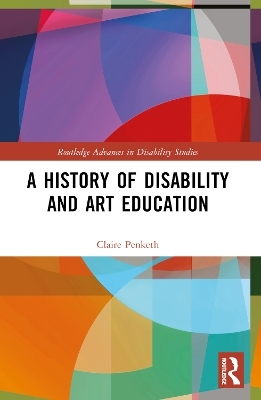
A History of Disability and Art Education
Routledge (Verlag)
978-0-367-53790-6 (ISBN)
Drawing on recent theoretical frameworks from critical disability studies and art education including normalcy, ableism, disability and Crip theory, this book offers an analysis of the conceptualisation of ability in art education and its relationship with disability.
Drawing on the work of Cizek and Lowenfeld in Austria, Ruskin and Richardson in England and Dewey and Eisner in the United States, it critically examines the influence of ideas such as the dominance of vision and visuality; the emergence of psychological perspectives; the Child Art Movement; the implications of assessment regimes; and the relevance of art education as a critical social practice on the production of disability.
Offering a sustained inquiry into the differential values attributed to learners and their work and the implications of this for framing our understanding of disability in art education, this book shows that although art educators have frequently advocated for the universal appeal and importance of art education, they have done so within historical contexts that have produced and determined problematic ideas regarding disability.
It will be of interest to all scholars and students of disability studies, art in education, art history and education studies.
Claire Penketh is Head of Disability Studies and Core member of the Centre for Culture and Disability Studies at Liverpool Hope University. She is Principal Editor of the International Journal of Art and Design Education and author of A Clumsy Encounter: Dyspraxia and Drawing. She is also co-editor of Disability, Avoidance and the Academy along with her colleague Professor David Bolt. Claire has published a number of special issues on the topic of disability studies and art education including Drawingability for Drawing Research Theory and Practice with Doris Rohr, The Biopolitics of Art Education for the Journal of Literary and Cultural Disability Studies with Jeff Adams and a thematic Issue on Disability Justice: Decentering Colonial Knowledge, Centering Decolonial Epistemologies for Research in Arts and Education with Alexandra Allen and Alice Wexler. She is a member of the National Society for Education in Art and Design Education (NSEAD) and chair of their special interest group on Anti-ableist Pedagogy.
Part I – Historicising Disability and Art Education. 1.Crafting Ocularnormativity: The Dominance of Vision. 2.Curating Deafness: Aesthetics and the Politics of Display. 3.Erasing Identities: Eugenics and IQ. 4.Child Art: The Making of Normative Youth. 5.Psychology: Troubling the Art-Education-Therapy Nexus. Part II – Recent Histories. 6.Containing Curricular: Regulation and Agency. 7.Modelling Diversity: (Dis)Placing Contemporary Art Practice. 8.Crisis and Precarity: Austere Times for Disability and Art Education. x.Epilogue: Advancing an Anti-Ableist Pedagogy.
| Erscheinungsdatum | 05.08.2023 |
|---|---|
| Reihe/Serie | Routledge Advances in Disability Studies |
| Verlagsort | London |
| Sprache | englisch |
| Maße | 156 x 234 mm |
| Gewicht | 331 g |
| Themenwelt | Kunst / Musik / Theater ► Kunstgeschichte / Kunststile |
| Schulbuch / Wörterbuch | |
| Studium ► Querschnittsbereiche ► Prävention / Gesundheitsförderung | |
| Sozialwissenschaften ► Pädagogik | |
| Sozialwissenschaften ► Soziologie | |
| ISBN-10 | 0-367-53790-7 / 0367537907 |
| ISBN-13 | 978-0-367-53790-6 / 9780367537906 |
| Zustand | Neuware |
| Informationen gemäß Produktsicherheitsverordnung (GPSR) | |
| Haben Sie eine Frage zum Produkt? |
aus dem Bereich


